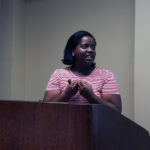Posted: 1/25/08
| Richard Cizik, vice president of governmental affairs for the National Association of Evangelicals. |
Christian voters broadening political
agenda, evangelical panelists say
By Robert Marus
Associated Baptist Press
WASHINGTON (ABP)—The Washington auditorium that once hosted a news program famous for back-and-forth arguments between political opponents instead recently featured a very different dialogue—a group of evangelical Christians denouncing the religious and political polarization of the last two presidential campaign cycles.
Panel participants, who ranged from former supporters of President Bush to some of his most vehement Christian critics, addressed the question, “Choosing a president: What do evangelicals really want?”
 |
| Jim Wallis, founder of Sojourners/Call to Renewal |
They spoke Jan. 23 on the George Washington University stage once used for the CNN show Crossfire.
The discussion validated many pundits observations that Christians in the United States are seeking new ways of adapting Christ’s commands to the political arena. While white evangelicals seem to be broadening their political agenda, evangelicals who are minorities are looking more critically at the Republican Party than in past elections.
“We are no longer single-issue voters, number one, and we’re not going to blindly follow prominent leaders in the Religious Right or otherwise who are telling us what we have to believe,” said Richard Cizik, vice president of governmental affairs for the National Association of Evangelicals.
Cizik, who opposes abortion and gay rights and twice voted for President Bush, is an outspoken proponent for Christians to combat global warming.
“For a lot of the young people I meet, the Religious Right has been replaced by Jesus,” said Jim Wallis, founder of Sojourners/Call to Renewal, an evangelical social-justice group. “Politics is stuck in its polarities—every issue has only two sides, and both sides do it.”
Wallis has been a frequent critic of many of President Bush’s policies, particularly regarding poverty and the Iraq war. He has also criticized Religious Right leaders for their closeness to Bush. His organization co-sponsored the discussion along with Beliefnet, the religion-focused Internet news site.
Such overt identification of evangelical Christians with the Republican Party is dangerous for Christians, one prominent African-American evangelical on the panel said. Harry Jackson, pastor of Hope Christian Church in suburban Washington, was one of only a handful of prominent black pastors to support Bush in both his 2000 and 2004 campaigns.
While Jackson declined to retract those endorsements, saying they were correct “at the time,” he did say that evangelicals’ support of Bush “was fear-based, versus vision- and passion-based.”
Even though he appreciated the moves that white evangelicals began to make 30 years ago to begin to affect the political process, Jackson said pinning their hopes on one party was a dangerous strategy.
“It’s impossible … to be a conscience to the entire nation and to be partisan as well,” Jackson said. “So, at some point we’ve lost our ability to be a conscience to the entire nation.”
Joel Hunter, pastor of an Orlando-area megachurch and a former president of the Christian Coalition, said the discussion reflected American evangelicals’ “forfeiting—at least in the last 50 years—of the agenda of Christ.”
That agenda, he continued, “was always to include the un-included. And I think when Christians got back into the political arena … they did it as a reaction against” the social revolutions of the 1960s.
Hunter said the evangelical political movement fell prey to the “certain seduction in political power that makes us all want to get in one category so that we can push through a particular political agenda.”
But, in politics, your agenda has to mature, he added. “It’s like the middle-school years— you’ve defined yourself by what you hate, what you’re not. But when you grow up, you have to define yourself by who you are, by what you build.”
The results of a Beliefnet poll of evangelicals, announced at the discussion, suggest that their agenda may be broadening beyond hot-button social issues.
It revealed that 41 percent of evangelicals identified themselves as Republicans, 30 percent as Democrats, and the remainder considered themselves independent or were affiliated with third parties.
Respondents also said the most important issue in the election is not abortion or gay rights, but the economy, with 85 percent ranking it either “most important” or “very important.”
In fact, they ranked six other issues above ending abortion on the scale of importance. Ending the Iraq war, caring for the poor, ending torture and cleaning up government all ranked ahead of the abortion issue. Preserving marriage as a heterosexual-only institution ranked even farther down the list, with less than half of respondents ranking it as important.
The poll was not scientific—it asked all Beliefnet readers about what issues they thought were the most important. It then considered results only from respondents who considered themselves evangelical or born-again Christians.
“There is a really interesting conversation going on now in evangelical Christianity,” said Steve Waldman, the founder and editor of Beliefnet, in announcing the survey results. “Although the press has gotten a little bit better at understanding (evangelicals), there is still a lot of stereotyping—people being put in boxes and a lack of awareness.”
One of the reasons for that, several panelists noted, is that when the media talks about “evangelical voters,” they almost always mean white evangelicals. African-American and Latino evangelicals, meanwhile, have always had broader policy agendas than their white counterparts.
“Immigration reform—that’s a moral issue for Latino evangelicals,” said Samuel Rodriguez, president of the National Hispanic Christian Leadership Conference.
“The major difference between Latino evangelicals and white evangelicals is that many white evangelicals take their marching orders from Bishop Rush Limbaugh, Prophet Sean Hannity… and many Latino evangelicals still listen to Matthew, Mark, Luke and John.”














We seek to connect God’s story and God’s people around the world. To learn more about God’s story, click here.
Send comments and feedback to Eric Black, our editor. For comments to be published, please specify “letter to the editor.” Maximum length for publication is 300 words.